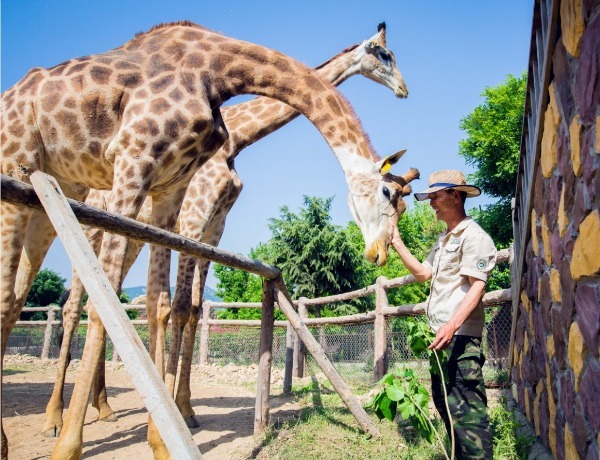Tour a zoo and adopt an animal on screen
By Wang Qian| (China Dail)| Updated : 2020-03-19
Print Print
A zookeeper takes care of giraffes at the Qingdao Forest Wildlife World in Qingdao, Shandong province, which held a virtual tour via Taobao Live on March 9.[Photo provided to China Daily]
The gates may be shut to the general public but one zoo has come up with a modern-day solution that gives "visitors" access and, through a unique adoption system, raises money for the upkeep of the animals.
More than 880,000 visitors explored the Qingdao Forest Wildlife World in Shandong province via Taobao Live on March 9. During the virtual field trip, animal lovers were able to "adopt" their favorites.
Two days before the tour, writer and rally driver Han Han announced his adoption of two hippos at the zoo on Chinese micro-blogging site, Sina Weibo. The post has been viewed more than 6 million times.
"Due to the COVID-19 outbreak, almost every sector is impacted. The chain reaction triggered is heartbreaking. Facing operational difficulties, some zoos launched animal adoptions. I have adopted two hippos at Qingdao Forest Wildlife World," Han posted.
The adoption program was launched late last month. Through symbolic adoption, the donation can help meet upkeep costs and purchase food for the animals, as well as support education and conservation projects.
"It can help create a special bond between human and animal, raising the public awareness about animal protection," Li Huanbin, director of the planning department at the Qingdao Forest Wildlife World, says. The private zoo, he adds, has been closed since Jan 24 and has encountered difficulties such as financial burdens and transportation obstacles.
With no notice of a potential reopening date, daily maintenance of the zoo costs about 160,000 yuan ($22,843). Before the epidemic, there were thousands of visitors to the zoo, but since its closure on Jan 24, its revenue has been reduced to zero.
To deal with the challenge, the zoo launched virtual tours, with discounts for presale tickets, lower adoption fees and extended membership.
The local government has released a slew of measures, including a relief fund, to help cultural and tourism companies weather the shutdown.
"Thanks to the government's preferential policy and support from the public, operation of the zoo is back to normal," Li says. During the closure, zookeepers disinfect the zoo twice daily compared with once every two weeks before the outbreak.
According to the zoo, the adoption fee for small animals like raccoons, turtles and squirrel monkeys is 360 yuan per year. For larger animals like hippos, giraffes and flamingos it is 1,000 yuan per year. There is a limit of 10 adopters for one animal. Adopters can enjoy free "entrance" and close "interaction" with their animals.
The program has been updated from an existing one that had been running for about 10 years. Before the outbreak, it mainly targeted companies, schools and institutes, when the adoption price was much higher, about 10,000 yuan per year for big animals like giraffes.
"This year, we hope more people can get involved in the program. Together we can make life better for the animals," Li says.
When the program ended on Friday, more than 5,000 people had inquired and nearly 1,000 had made an adoption. These included more than 20 from the United States, Japan, Canada and Singapore, Li says. The zoo houses about 3,000 animals with 180 species.
To help the public get "close" to the animals during the shutdown, the zoo also launched virtual tours on livestreaming platforms such as Taobao Live, Douyin and Yizhibo in mid February.
Usually lasting about an hour, viewers follow zookeepers' cameras, enjoying some often hilarious and touching moments with the animals including hippos, tigers and alpacas. It is also a tour packed with interesting information and facts about popular animals.
During a recent virtual tour early this month, one of the hippos adopted by Han opened his mouth wide to let a zookeeper brush his teeth with a giant toothbrush, a ritual he clearly enjoys every day. Weighing about 3 metric tons, the 15-year-old hippo eats about 100 kilograms of grass and fruit daily.
Li explains when adopters like Han come to the zoo, they can help brush the teeth of their adopted hippos.
Besides interaction with the animals, Li adds adopters also enjoy privileges such as naming their animals, free admission and free parking at the zoo. Adopters can also contact the zoo for the latest information on their animals.
"An adoption ceremony will be held when the zoo reopens," Li says.
For Guo Jingchun, 24, in Tianjin, who adopted a raccoon at the zoo, the program is a step closer to her dream of being a zookeeper.
Guo says she doesn't care about adopters' privileges, she only wants to make sure the animals have adequate food.
Many other zoos, including Beijing Zoo, Shanghai Zoo and Chongqing Zoo, have moved online.
"People kept calling the zoo and expressing their eagerness to see the animals during the epidemic, so we adopted an online approach," says Yang Yi, deputy chief of Chongqing Zoo's science and education department.
Online zoos can help operators attract fans at low cost, which may promote future interaction, Beijing Business Today quoted Wu Liyun, a professor at the China Academy of Culture and Tourism under the Beijing International Studies University, as saying.
Six of Shanghai's major parks-Shanghai Botanical Garden, Shanghai Zoo, Shanghai Chenshan Botanical Garden, Gongqing Forest Park, Guyi Garden and Riverside Forest Park-reopened on Friday.

 Insights from the 10th Nishan Forum
Insights from the 10th Nishan Forum  Confucian culture thrives: Integrating its wisdom into modern value
Confucian culture thrives: Integrating its wisdom into modern value  Confucianism's enduring influence: Shaping East, Southeast Asian civilizations
Confucianism's enduring influence: Shaping East, Southeast Asian civilizations